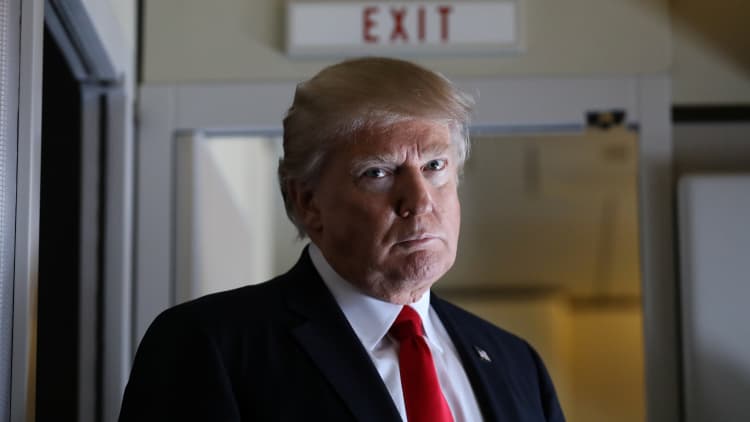Companies may finally see more reason to invest back into their businesses, thanks in part to their hope for less regulation.
The first quarterly earnings reports since the election point not only to another quarter of growth but also general optimism in business plans to spend on equipment and hiring. That aspect of business is known as "capital expenditure," and its lackluster growth since the financial crisis of 2008 has contributed to the sluggish economic recovery.
Now it looks as if capital spending may finally be set to pick up. The economy is improving, and businesses could get a boost from new policies under the Trump administration.
"I see a tone change in how the CEOs are speaking about earnings," said JJ Kinahan, chief strategist at TD Ameritrade. "They, by and large, are talking about growth rather than about being able to meet targets."

Executives on fourth-quarter earnings calls discussed business investment far more than they did tax reform, deregulation, interest rates or trade, according to analysis made of calls between Jan. 1 and Feb. 2 by AlphaSense, a financial search engine.
Phrases related to capital spending such as "capital expenditure," "capex," and "investing in research and development" had 1,027 mentions, the analysis of 221 S&P 500 companies showed. Tax-related terms appeared 639 times, interest rates were discussed 353 times, trade policy had 108 mentions and deregulation had 59 mentions, the study found.
"There was a general optimism from management in areas that would benefit the most from deregulation," said Jill Carey Hall, a U.S. equity strategist at Bank of America Merrill Lynch.
President Donald Trump has already signed executive orders aimed at limiting new regulation and calling for review of Dodd-Frank regulations on financial firms.
In a Friday note, Jefferies Chief Market Strategist David Zervos proposed that regulation is the "largest driver of weak investment, low GDP growth, and low equilibrium real rates."
He pointed to a chart from the libertarian think tank Competitive Enterprise Institute that suggested roughly 10 percent of GDP is associated with the cost of federal regulation and intervention.
Regulation may be one of the areas in which businesses may soon see some relief, but the larger policy change companies are hoping for are tax cuts.
"I'd say corporate tax reform would have a greater impact right away than reducing regulation, but in certain industries, reducing regulation would have a big impact right away," said John Canally, chief economic strategist at broker-dealer LPL Financial.
"Overarching all this is, the average plant equipment in the economy is just as old as it has been in fifty years, and that needs to be updated," Canally said.
Another clue on spending: Tech earnings
Among the 11 S&P 500 industrial sectors, technology is tracking second-best in earnings per share and revenue growth, according to Thomson Reuters. Tech firms led earnings growth in the third quarter last year but were fifth in sales growth.
"Companies must be investing in infrastructure for tech companies to be doing so well," said Michael Jones, chairman and CIO of RiverFront Investment.
Jones likes to compare reported results with estimates from half a year earlier, since earnings expectations tend to come down over time. And among tech firms, he said 75 percent reported revenue that beat expectations they gave six months ago.
Overall, fourth-quarter 2016 earnings for the S&P 500 are set to post 8.2 percent growth in earnings per share, up from 4.3 percent the prior quarter and after four straight quarters of declines, according to Thomson Reuters.
While the major consumer-focused companies have yet to report, "we have some sense of manufacturing and cyclical businesses, intermediary [market] and banks, so you have a good sense on the investment front," said John Toohey, vice president, equity investments, at USAA Asset Management. He noted that business spending was increasing slightly.
That said, increased talk of such investment couldcreate overly optimistic sentiment in an economy that slowed to 1.6 percent annual growth in 2016 from 2.6 percent the prior year.
"At the end of the day, whether it's tax cuts or deregulation, businesses hire and invest when they're swamped with customers," said Stephanie Kelton, professor of economics at the University of Missouri-Kansas City.
Watch: Deregulation could be huge for banking industry



